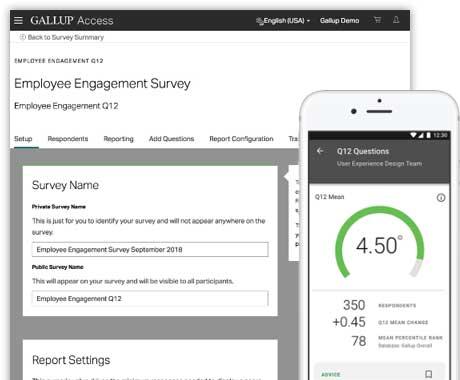Story Highlights
- The world's best managers share how to lead successfully and navigate change
- The manager plays a singular role in the life of an employee
In nearly every dimension of business success, the manager makes the difference. From diversity and inclusion to productivity and retention, the manager plays a singular role in the life of an employee.
In fact, Gallup's analysis has shown that the quality of a manager accounts for 70% of the variance in team engagement.
And yet most managers learn best management practices based on managers they've had (who may have been good or bad) -- or based on stereotypes in their head about what "leadership" is.
Learn what makes a great manager from the world's best managers from some of the world's most engaged organizations.
Every year, Gallup client organizations that meet the award criteria are invited to apply for the Gallup Exceptional Workplace Award (formerly the Gallup Great Workplace Award). As part of that application process, they are invited to nominate the best manager in their organization for the Gallup Manager of the Year Award.
This summer we sat down with the 2019 Manager of the Year finalists and asked them how they lead, how they navigate change in the workplace and how they developed successful teams. Here are some of the highlights from that roundtable discussion:
1. Connect company purpose to individual and team action.
Nearly every organization today is going through massive change, from regulatory changes to new competition to technological disruption. One manager in the healthcare industry explained how she leads during change:
"If everybody understands why we need to do this -- not just because our leaders say we need to do this or that -- they are more willing to make that change."
Only four in 10 U.S. employees strongly agree that the mission or purpose of their company makes them feel their job is important. This means that most employees are at least a little unsure about how their work fits into the "big picture." So, when big changes are required, many employees lack motivation. It's the manager who is ultimately responsible for making that connection.
If managers don't know why their team is being asked to do something, they should ask leaders for the purpose behind the task or project.
What if your leaders won't give you a reason why?
"Keep asking until you get one!" one manager laughed. "Good leaders should appreciate questions and debate."
2. Shine a light on the opinions of others and make them count.
Change requires innovation. But how can managers inspire more innovation from their workers?
"If you know the people on your team, you know who the creative thinkers are. You have to get everyone to speak and voice their opinion."
New managers often feel like they ought to be the ones with all the answers. But asking for ideas to help solve problems and improve performance is actually a sign of manager confidence.
In nearly every dimension of business success, the manager makes the difference.
Only a third of U.S. employees strongly agree that their opinion at work seems to count. But when a manager takes an employee's opinion seriously and acts on it, that employee feels respected, connected and committed to the team. And, of course, a good idea improves outcomes for everyone else.
Even if you can't make additional changes to a plan, hearing someone out is still valuable.
3. Coach your team in a way that allows for genuine candor.
One manager described how they developed a culture of safety at his workplace:
"Every morning we have a safety huddle. I ask, 'Has anything happened?' We created a culture where it's OK to say we messed up. Everybody knows we're a team, and we are going to work together to fix it."
Continual improvement can only be achieved through honest conversation. On a related note, great managers ask questions that lower defenses. When dealing with a low-performing employee, a manager may ask, "What's fun for you at work right now? And what's not really that fun?"
An employee's answers can give a manager clues to challenges or roadblocks without making an employee feel like they are being grilled.
4. Commit to one meaningful conversation a week with each team member.
Most managers realize that communication matters. But how does that work when your team is mostly remote or often traveling? One sales manager described her routine:
"I speak with them over the phone if not daily, weekly. It's a very hard job we're asking our sales reps to do, so we have to make sure they are staying engaged."
Other managers agreed that they connect with team members on a daily or weekly basis. That's surprisingly rare in most workplaces. Gallup finds that only 20% of U.S. employees strongly agree that they have had a conversation with their manager in the last six months about the steps they can take to reach their goals.
Continual improvement can only be achieved through honest conversation. More often than not, the cause is a system problem -- and that means that other people and teams need to learn and change to truly fix the root problem.
However, these conversations don't always have to be strictly about getting work done. Managers should ask questions that get employees to talk freely about themselves, sharing their desires and frustrations with candor.
The average manager may not feel comfortable with so much dialogue if they aren't used to it. That's why most managers need targeted training to make coaching conversations effective.
5. Unlock human motivation by connecting work to a person's innate tendencies.
One manager, who works in engineering, describes what he loves about being a manager:
"I really think when you get to the right spot with an individual, you find out what trips their trigger, what gets them excited -- getting the next order, beating the competition, solving a hard problem -- that lets you light the fire in them."
Exceptional managers are curious about the inner motivations of their employees because it's the key to high performance. Does your employee enjoy meeting new people? Mastering new skills? Bonding with a team? Working in the background?
To motivate your employees, figure out how to reframe projects in a way that is uniquely compelling for an employee.
Naturally, this requires getting to know an employee in a deep way. Discover what they care about, what they find fun, what they hate. Observe the types of work projects that inspire them and help them find similar work.
6. Recognize and reward excellence.
One manager described what she did when she first started leading people to manage change in the workplace:
"I started as a supervisor in our billing department. A lot of people in the company did not look at them as an important aspect of the company, but they really are. I went in and showed them how important they are and the role they have in the company. And within three to four months I had employees come in my office to tell me what an impact that made."
How many employees show up to work for years and never feel like they matter? Only three in 10 U.S. employees strongly agree that in the last seven days they have received recognition or praise for doing good work.
If you are a new manager with a demoralized team, it may take some time to uncover the source of that discouragement. You must show them that you respect them and that they matter. You must be able to identify and celebrate successes -- even if they are small at first. Even if nobody else believes in your team, you must -- encourage your employees, and do it often. These are all qualities of a great manager.
7. Care about your employees as real people.
Several managers mentioned that being successful as a manager means thinking beyond the workplace:
"You're there for them if they have a sick child or a sick parent. I think a lot of people outside of management don't realize the impact we make on their lives, dealing with all the experiences beyond the job."
Another sales manager described her vision when she started:
"I committed to my team when I started … I want to help you build the best life that you can."
Life happens. And life also impacts work performance in a huge way. For this reason, managers need to understand their employees as people with full lives. Managers should know, at an appropriate level, what's going on in an employee's life. Are they buying a house? Adopting a child? Cleaning out a flooded basement?
Ultimately, the manager's job is to get the most out of their people. But great managers find ways of adapting, adjusting and individualizing roles to fit the needs of employees. Small tweaks can make a big difference in how much an employee loves their job. And simply knowing that your manager cares about you has a strong correlation with engagement at work.
8. Make your No. 1 job the development of new stars.
When we asked great managers what their top priorities were for the coming year, several mentioned:
- "succession planning"
- "promoting others"
- "developing other managers"
- "identifying people who can take over"
Clearly, their minds were on these questions: Who has potential for future leadership, and how do I prepare them to get there?
Bad managers focus on the past -- what can't be changed. Average managers focus on the present -- the issue at hand. But the best managers focus on the future -- what does future success look like?
Great managers see themselves as coaches, developing players to maximize their potential over the long term.
Gallup Exceptional Workplaces have significantly higher employee engagement rates than the global and U.S. average. Ready to take your organization to the next level? Learn more about how Gallup recognizes exceptional workplaces.
When being a good manager is no longer good enough, consider this:
- Partner with Gallup and explore our solutions for manager and team leader development.
- Read It's the Manager for 52 insights that will give your managers the information they need to join the ring of "world-class" managers.
- Building a high-development workplace culture is driven by engagement -- and engagement is driven by the manager. Read Gallup's perspective paper on employee engagement.





